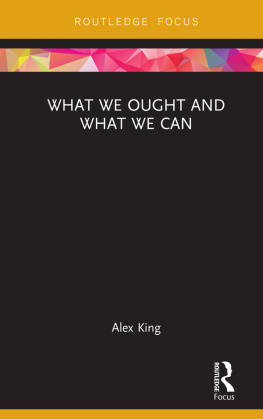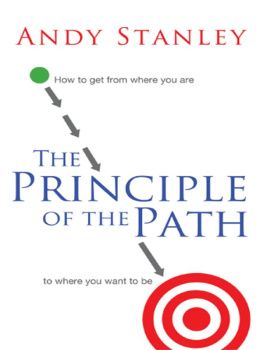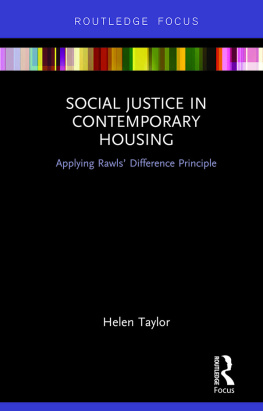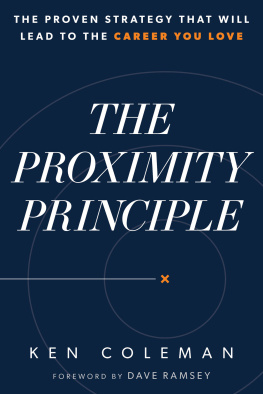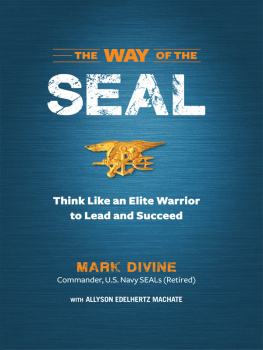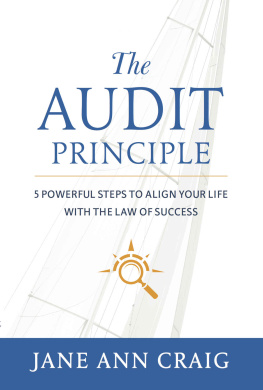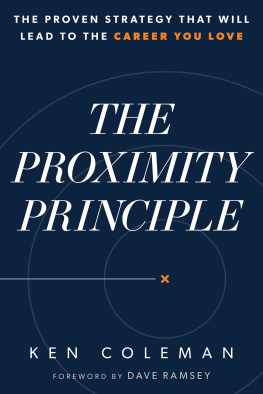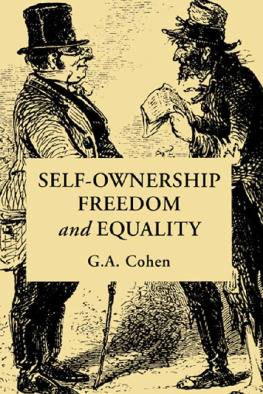I began thinking about this topic in a graduate seminar on ideal theory in political philosophy, so I suppose thats where the acknowledgments should begin. I am very grateful to Dave Estlund for assigning the Kant essay that set me on this path in the first place, and for encouraging my incipient thoughts on it. He has been a wonderful and kind interlocutor, but always a firm and stalwart defender of Ought Implies Can, and so an extremely useful foil for my thinking on these matters. Before I knew it, I had a dissertation.
Because this book grew out of my dissertation, or more precisely, grew out of issues present in my dissertation, I owe thanks to my friends and mentors in graduate school, who all helped me in various ways. First, I cannot thank enough my adviser, Jamie Dreier, for his support and guidance both then and now. At once my greatest champion and my greatest critic, his encouragement and critical feedback made me the philosopher I am today. I am also very grateful to Nomy Arpaly and Julia Driver who, in addition to Dave Estlund, made up the rest of my dissertation committee. They provided invaluable feedback on the formative stages of what now appears here. I also owe thanks to my dissertation buddy, Steven Yamamoto, and to everyone else throughout graduate school whose comments and discussion helped me think through these matters. I would like to extend particular thanks to Sean Aas, Derek Bowman, Sarah Chervinsky, Emma Cunningham, Phil Galligan, Dana Howard, Charles Larmore, Josh Schechter, and Tim Syme.
Shortly after I arrived at the University at Buffalo (yes, at), more commonly known as SUNY Buffalo, I was invited to spend seven months at the Australian National University. I received a research fellowship from the ANU as part of an Australian Research Council (ARC) Discovery Project on Political Normativity and Feasibility Requirements. The project was headed by Nic Southwood and Geoff Brennan, to whom I am very grateful not only for their discussion and friendship (and occasional wine), but for inviting me to spend time at ANU in the first place, where I met many friends and continued refining the ideas contained in this book. Thank you especially to Emily McTernan, whose friendship and feedback and company during our regular Monday afternoon work sessions got me through a lot. Thanks also to Christian Barry, Sarah Hannan, Seth Lazar, RJ Leland, Matt Lindauer, Luke Roelofs, and Kai Spiekermann, and all of the usual suspects at ANU tea times and colloquia for innumerable conversations and feedback while I was working through many of these issues.
I am thankful to everyone who along the way enhanced my thinking about these issues with examples, comments on drafts, discussion, and more. Friends and colleagues worth particular mention are Amy Berg, David Braun, Ray Briggs, Mark Budolfson, Norman Dahl, Greg Frost-Arnold, Bob Kelly, Jake Monaghan, Sofia Ortiz, Doug Portmore, Lewis Powell, and Jack Woods.
I have presented various parts of the work that appears here at the Central APA Meeting in 2013, the University of Florida, Texas Christian University, the University at Buffalo, the National University of Singapore, the University of Sydney, the University of Canterbury, the Australian National University, and the Buffalo Women in Philosophy group. I also ran a graduate seminar on OIC in fall 2014. My heartfelt gratitude goes out to all of those audiences. The feedback I received in all of these places was extremely valuable. It helped develop the papers that grew out of those talks, and it helped shape this book.
I also owe special thanks to Jonathan Jenkins Ichikawa, who introduced me to Tony Bruce, my editor at Routledge, and who suggested that I write this book in the first place. I am very grateful to Tony for his encouragement and for his comments on the proposal and manuscript, and to Adam Johnson and Autumn Spalding at Routledge, whose patience with me has not gone unnoticed.
For improvements and feedback on the book itself, I owe most to a set of fantastic referees for Routledge. Their immensely insightful and constructive comments on the proposal and on the manuscript greatly improved the final product. I am genuinely thrilled to have received such a charitable and thoughtful set of referees.
For moral support throughout graduate school and during the past five years, Id like to thank my dear friends Danielle Sedbrook, Sheena van Leuven, Leslie Widing, and of course my parents, Chris and Marie King.
Finally, I am especially grateful to my partner, Nic Bommarito, whose support and encouragement have been immeasurable, and whose sometimes overly fierce engagement with these topics has always spurred me to better articulate my (and others) views. Its to him that I owe the greatest debt of gratitude. And I really ought to remember this, even in those moments when I cant.
Alston, William P. The Deontological Conception of Epistemic Justification. Philosophical Perspectives 2 (1988): 257299.
Arpaly, Nomy. Merit, Meaning, and Human Bondage: An Essay on Free Will . Princeton, NJ: Princeton University Press, 2006.
Arthur, John. Famine Relief and the Ideal Moral Code. In Ethics in Practice: An Anthology , ed. Hugh LaFollette, 3rd ed., 623632. Malden, MA: Blackwell, 2007.
Austin, John. A Plea for Excuses. Proceedings of the Aristotelian Society 57 (1956): 130.
Benn, Claire. Over-Demandingness Objections and Supererogation. In The Limits of Moral Obligation: Moral Demandingness and Ought Implies Can , ed. Marcel van Ackeren and Michael Khler, New York: Routledge, 2016.
Berg, Amy. Ideal Theory and Ought Implies Can. Pacific Philosophical Quarterly 99, 4 (2018): 869890.
Besch, Thomas M. Factualism, Normativism and the Bounds of Normativity. Dialogue 50, 2 (2011): 347365.
Bloomfield, Paul. Two Dogmas of Metaethics. Philosophical Studies 132, 3 (2007): 439466.
Blum, Alex. The Kantian Versus Frankfurt. Analysis 60, 3 (2000): 287288.
Boxill, Bernard. The Color-Blind Principle. In Blacks and Social Justice , 918. Lanham, MD: Rowman & Littlefield Publishers, 1984.
Brandt, Richard B. A Theory of the Good and the Right . New York, NY: Prometheus Books, 1998.
Brown, James. Moral Theory and the Ought Can Principle. Mind 86, 342 (1977): 206223.
Buckwalter, Wesley. Ability, Responsibility, and Global Justice. Journal of the Indian Council of Philosophical Research , forthcoming.
Buckwalter, Wesley, and John Turri. Inability and Obligation in Moral Judgment. PLoS ONE 10, 8 (2015).
Bykvist, Krister, and Anandi Hattiangadi. Does Thought Imply Ought? Analysis 67, 4 (2007): 277285.
Chituc, Vladimir, Paul Henne, Walter Sinnott-Armstrong, and Felipe De Brigard. Blame, Not Ability, Impacts Moral Ought Judgments for Impossible Actions: Toward an Empirical Refutation of Ought Implies Can. Cognition 150 (2016): 2025.
Chuard, Philippe, and Nicholas Southwood. Epistemic Norms Without Voluntary Control. Nos 43, 4 (2009): 599632.
Collingridge, David G. Ought-Implies-Can and Humes Rule. Philosophy 52, 201 (1977): 348351.
Conee, Earl. Against Moral Dilemmas. Philosophical Review 91, 1 (1982): 8797.
Cooper, Neil. Some Presuppositions of Moral Judgments. Mind 75, 297 (1966): 4557.
Copp, David. Defending the Principle of Alternate Possibilities: Blameworthiness and Moral Responsibility. Nos 31, 4 (1997): 441456.
. Ought Implies Can, Blameworthiness, and the Principle of Alternate Possibilities. In Moral Responsibility and Alternative Possibilities: Essays on the Importance of Alternative Possibilities , ed. David Widerker and Michael McKenna, 265299. Burlington, VT: Ashgate, 2003.
. Ought Implies Can and the Derivation of the Principle of Alternate Possibilities. Analysis 68, 1 (2008): 6775.
Cullity, Garrett. Demandingness, Ought, and Self-Shaping. In The Limits of Moral Obligation: Moral Demandingness and Ought Implies Can , ed. Marcel van Ackeren and Michael Khler. New York: Routledge, 2016.

